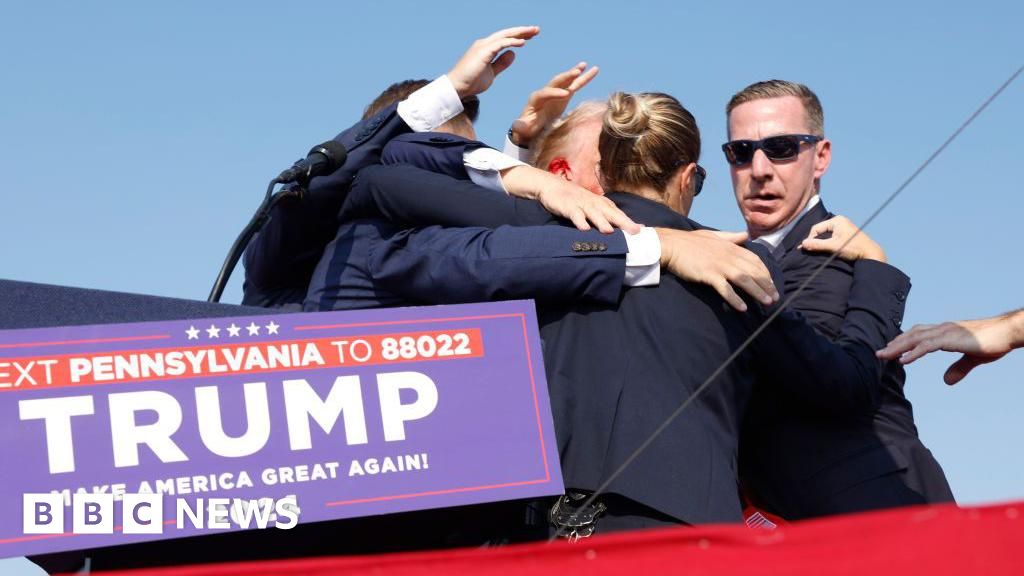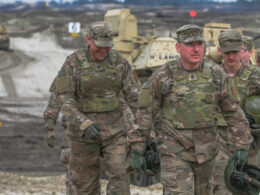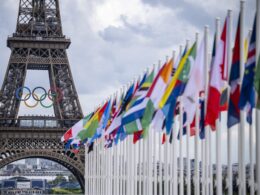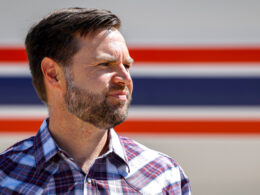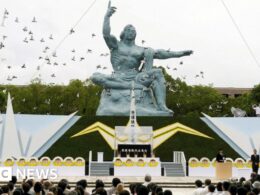Trump shooting: The plan and the botched security
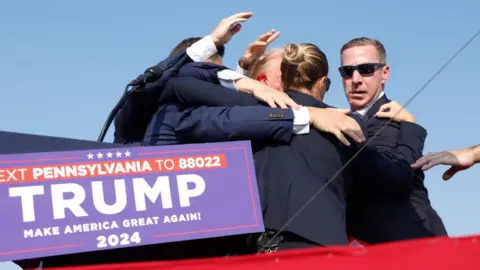 Getty Images
Getty ImagesThomas Matthew Crooks walked into Donald Trump’s election rally in Pennsylvania, unopposed with a gun, explosives and a rangefinder to measure distance to his target.
The aftermath of the 13 July shooting reveals a detailed plan hatched in the days before – and a series of security failings that allowed its execution.
Three congressional hearings were held this week with the head of the FBI, the Secret Service’s director and Pennsylvania’s state police chief.
Here is what those hearings have added to what is known about the attempt on Trump’s life, what went wrong, and important unanswered questions.
The preparation
It is becoming clear that Crooks’ attack was not the result of a last-minute meltdown: He had method, and purpose.
The FBI has said that 6 July appeared to be the inception date: Crooks registered to attend Trump’s rally, and researched the assassination of President John F Kennedy, googling: “How far away was Oswald from Kennedy?”
“That’s a search that’s obviously significant in terms of his state of mind,” Christopher Wray, the FBI’s director, told the House Judiciary committee on Wednesday. He added that searches by Crooks then became “focused” on Trump.
He was working alone – the FBI say they do not think he received any help.
There was also reconnaissance. Mr Wray said Crooks was flying a drone about 200 yards (183m) from the stage two hours before Trump’s rally.
Its camera ran for about 11 minutes, Mr Wray said, and the footage would have shown “a rear-view mirror of the scene” behind Crooks’ eventual firing position.
Mr Wray said that Crooks had bought an AR-15-style rifle from his father, legally, although he did not say when. The gun had a collapsible stock, making it easier to conceal.
State police officers reported him using a rangefinder, a marksman‘s aid that measures distance to a target, as the rally got under way.
Crooks had also obtained explosives: two “crude” devices fitted with receivers were found in Crooks’ car after the attack, Mr Wray said, and a transmitter was found on his body.
A bloodied receipt was also found on Crooks for a 5ft ladder, Mr Wray said – suggesting a recent buy. No ladder was found at the site, however, and Mr Wray said Crooks had used “mechanical equipment” to get to his perch – but did not elaborate.
And so Crooks turned up on the day with a concealable rifle, knowledge of previous assassinations, a rangefinder, two bombs, and detailed information on the layout of the area.
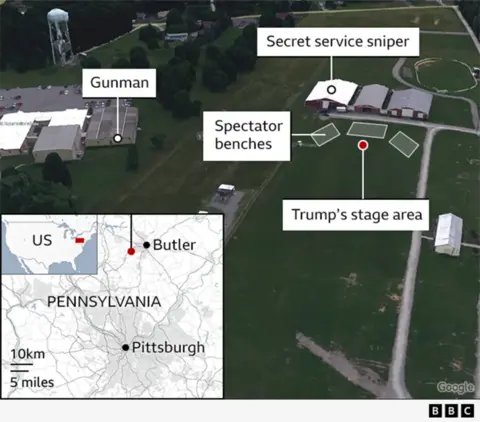
A plan in action
It should be impossible for a man to walk into a presidential rally with so much gear, let alone carry it up to an undefended roof with a direct line of sight to the stage. But this is exactly what happened in Butler.
Statements to the House Homeland Security committee by Pennsylvania’s police commissioner, Christopher Paris, convey a series of lapses from law enforcement.
The venue had two layers of security – an outer area patrolled by state police and an inner perimeter manned by Secret Service agents, including an anti-sniper team on a roof behind the stage.
An operations centre was staffed by members of the various agencies present. But on the day, communication was haphazard and areas of responsibility unclear.
Mr Paris told his hearing that state police were responsible for the area around the AGR International warehouse, the building from which Crooks fired that was around 400ft (122m) from the stage with a clear line of sight.
He revealed his men had raised its risk in the days before the rally and were told by the Secret Service that it was a state police matter as it was in the outer area.
As a consequence, a local SWAT-style Emergency Services Unit (ESU) team was stationed inside the building complex, Mr Paris added.
The New York Times reported that the team was in fact two men who stayed inside because of the hot weather. The plan had been approved by the Secret Service, the newspaper’s source said.
Kimberly Cheatle, director of the Secret Service until she stepped down this week, told lawmakers she could not account for why no one was stationed on the roof.
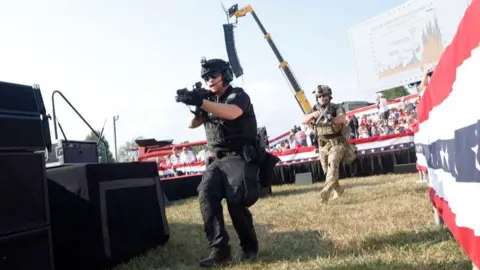 Getty Images
Getty ImagesWhat went wrong?
Mr Paris said the first sighting of Crooks came from a state police ESU unit.
Unlike others in the crowd, Crooks was walking around and did not try to enter the venue, he said. “Crooks never made it through the secure perimeter.”
He was not challenged. Mr Paris said he was one of three people flagged as “suspicious” at this point in the event.
About 25 minutes before the rally began, however, Mr Paris said that the ESU team spotted him again – this time using his rangefinder, though no gun was reported.
This is perhaps the point where security broke down irrevocably.
A photograph of Crooks was sent by a member of the ESU team to a state trooper in the joint operations room. Mr Paris said that a Secret Service liaison asked the trooper to send the photo to another number.
At this point, it seems that agents charged with protecting Trump did not consider Crooks dangerous enough to act – no weapon had been spotted.
During her fractious hearing before the House Oversight committee on Monday, Ms Cheatle acknowledged her agents were told about Crooks at least twice before the shooting began.
She said that agents only became aware of the gravity of the threat “seconds before the gunfire started”.
The crucial moments
Mr Paris said several local police, including the ESU team, then began searching for Crooks. It appears he was lost again, despite his growing threat.
Witnesses told the BBC that by this point they had seen a man with a gun crawling along a roof. All of this was happening with Trump already on stage.
Mr Paris said that Crooks was eventually seen on the roof by local traffic police and his ESU team. One traffic officer boosted up to the roof by a colleague was forced to fall back after being confronted by Crooks, Mr Paris told the hearing.
That confrontation, the commissioner said, happened “a matter of seconds” before the shooting.
Agents surrounded Trump immediately after the first shots, and he was off the stage within two minutes. By this point Crooks had been shot dead by a sniper.
A video recorded on the roof about an hour after the attack shows snipers and Secret Service agents trying to understand who saw what and when, adding to the sense of confusion among law enforcement.
Eight bullet casings were found near his body. He had killed one crowd member and injured two others.
In his evidence to Congress, Mr Wray said that with respect to Trump there was “still some question of whether or not a bullet or shrapnel hit his ear”.
Trump has said he “took a bullet for democracy” but has given no official information about his medical care.
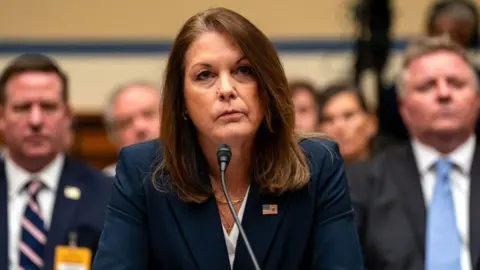 Getty Images
Getty ImagesWhy was Trump allowed on stage?
Trump was on stage for around 10 minutes between the moment Crooks was spotted on the roof with a gun and the moment he fired his first shot.
There is almost no public account of the Secret Service’s actions and decisions during the rally. Ms Cheatle declined to answer most of the questions put to her in Congress – down to how many agents were protecting Trump.
We do know, via Ms Cheatle, that agents dismissed the alerts about him because he was not seen with a weapon.
She could not provide her hearing a detailed timeline, as requested, saying she “did not have specifics”.
She quit as director of the Secret Service a day after her hearing, under pressure from both sides of the House, and it seems we won’t get answers any time soon.
What was Crooks’ motive?
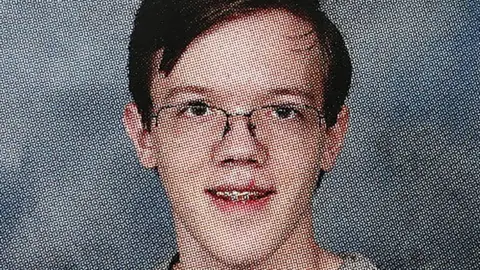 Reuters
ReutersMore than a week on, we still do not know of any specific ideology or belief that drove Crooks to do what he did.
Mr Wray of the FBI told his hearing that a motive was one of the “central questions” of his bureau’s investigations.
However, he said that interviews with Crooks’ associates and searches of his home and online history did not give a “clear picture”.
Analysis of the gunman’s phone showed that he had “done a lot of searches” for news articles – but there was no pattern, Mr Wray added.
Investigators were still decrypting messages on the phone, he said.
We know he donated $15 to a Democratic Party platform shortly after the Capitol riot of 2021, then months later registered as a Republican.
No “manifesto” has been found.
What he planned to do with his explosives, meanwhile, remains unclear – Mr Wray said that while his bombs were viable, their receivers were off and Crooks would not have been able to detonate them remotely.




